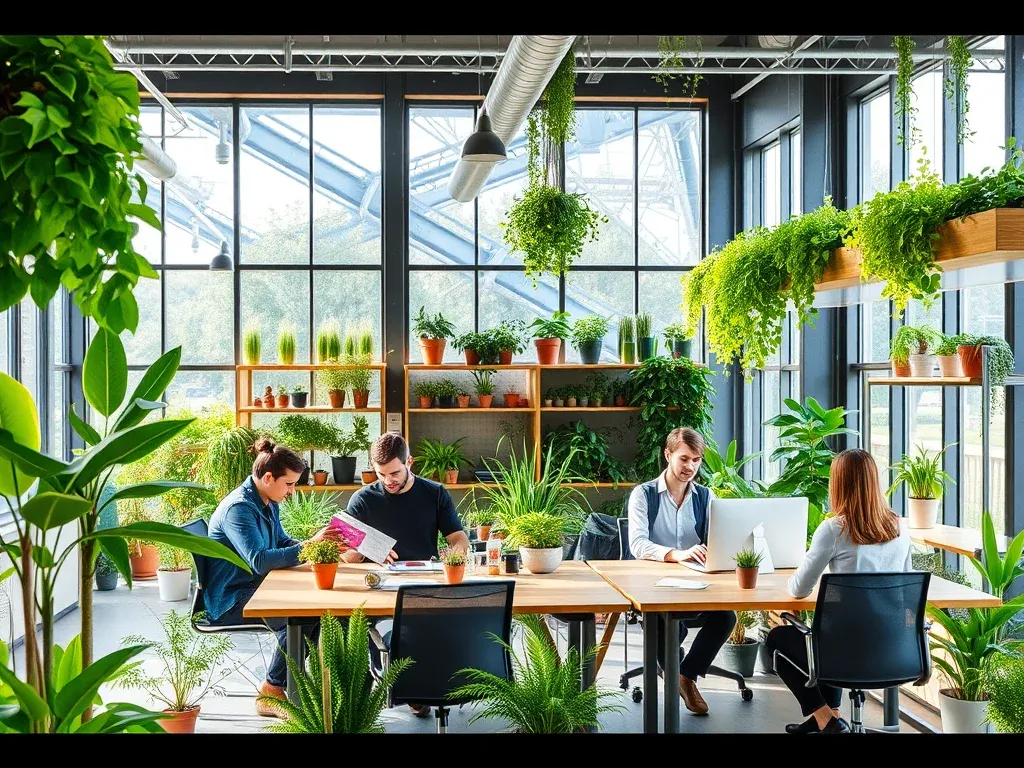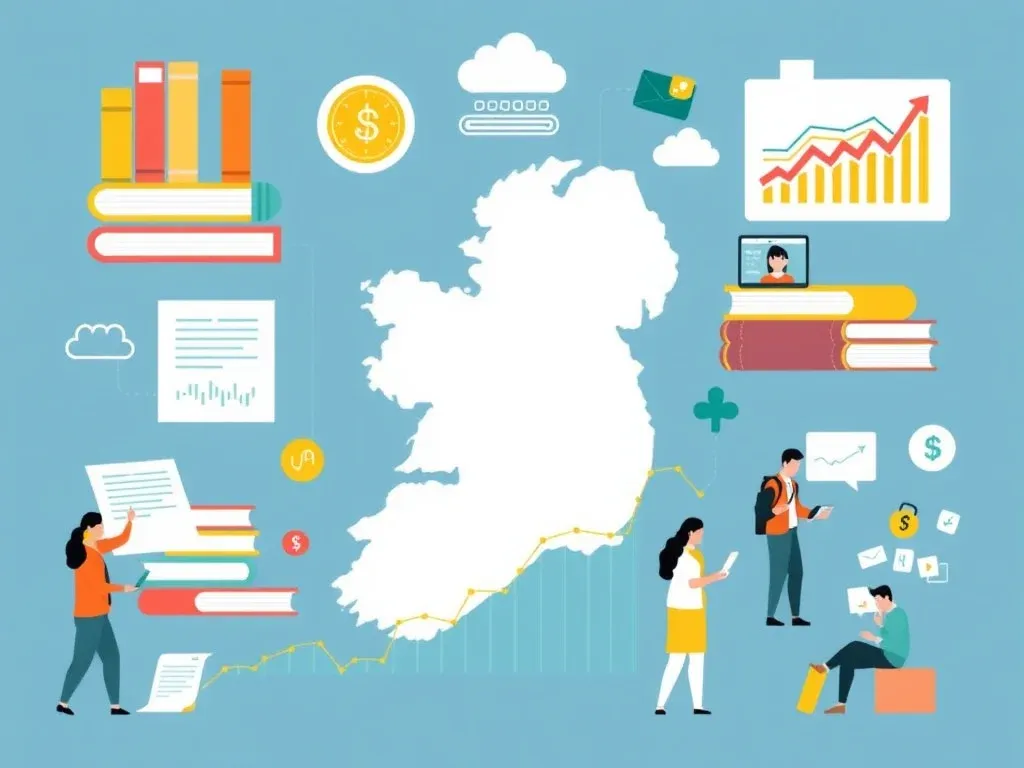Table of Contents
- Table of Contents
- Introduction
- Pro Tip
- Ireland’s Sustainability Landscape
- Policy Framework
- Economic Transformation
- Regional Developments
- Pro Tip
- Key Green Sectors and Opportunities
- Renewable Energy
- Sustainable Built Environment
- Circular Economy
- Pro Tip
- Skills and Qualifications for Green Careers
- Technical Skills
- Transferable Skills
- Education and Certification
- Pro Tip
- Finding Sustainable Job Opportunities
- Specialized Job Platforms
- Industry Organizations
- Application Strategies
- Pro Tip
- Corporate Sustainability Roles
- Emerging Positions
- Industry Variations
- Career Progression
- Pro Tip
- Eco-Friendly Workplace Practices
- Office Sustainability
- Employee Engagement
- Remote and Hybrid Work
- Pro Tip
- Transitioning to a Green Career
- Skill Mapping
- Knowledge Development
- Transition Strategies
- Pro Tip
- Green Entrepreneurship in Ireland
- Opportunity Areas
- Support Ecosystem
- Business Model Considerations
- Pro Tip
- Government Initiatives and Support
- Skills Development Programs
- Employment Schemes
- Policy Frameworks
- Pro Tip
- Success Stories and Case Studies
- Career Transitions
- Green Business Development
- Organizational Transformations
- Pro Tip
- Challenges and Considerations
- Market Realities
- Greenwashing Awareness
- Balancing Idealism and Practicality
- Pro Tip
- Networking in the Sustainability Community
- Professional Organizations
- Events and Conferences
- Online Communities
- Pro Tip
- Future Trends in Sustainable Careers
- Emerging Fields
- Technology Integration
- Skill Evolution
- Pro Tip
- Conclusion
- Related Posts
Sustainable Careers in Ireland: Green Jobs and Eco-Friendly Workplaces
Reading time: 15 minutes
As Ireland commits to ambitious climate targets and a sustainable economic future, career opportunities in green sectors are expanding rapidly. This guide explores the growing landscape of sustainable careers in Ireland, from renewable energy and green construction to corporate sustainability roles, providing insights on skills development, job searching strategies, and how to contribute to Ireland’s transition to a greener economy.
Introduction
The global shift toward sustainability is transforming Ireland’s economy and creating new career pathways across multiple sectors. As the country works toward its Climate Action Plan goals—including a 51% reduction in greenhouse gas emissions by 2030 and net-zero emissions by 2050—organizations across all industries are adapting their operations and creating roles focused on environmental responsibility.
This transformation presents significant opportunities for professionals at all career stages. Whether you’re a recent graduate looking to start your career with purpose, a mid-career professional seeking to pivot toward more meaningful work, or an experienced leader aiming to drive sustainability initiatives, Ireland’s green economy offers diverse and growing possibilities.
In this guide, we’ll explore the landscape of sustainable careers in Ireland, examining key sectors, required skills, job search strategies, and ways to contribute to Ireland’s environmental goals through your professional path. We’ll also look at how traditional workplaces are becoming more eco-friendly and how you can help drive sustainability initiatives regardless of your role.
Pro Tip
When exploring sustainable career options in Ireland, look beyond job titles that explicitly include terms like “sustainability” or “environmental.” Many traditional roles are evolving to incorporate green responsibilities, and highlighting your sustainability knowledge and passion can differentiate you even when applying for conventional positions.
Ireland’s Sustainability Landscape
Policy Framework
Ireland’s approach to sustainability is shaped by several key policies and commitments:
- Climate Action Plan: Ireland’s roadmap for reducing emissions across all sectors of the economy, with specific targets and actions.
- European Green Deal: The EU’s comprehensive plan to make Europe climate-neutral by 2050, which influences Irish policy and funding.
- Circular Economy Strategy: Ireland’s plan to transition from a linear to a circular economy, reducing waste and maximizing resource efficiency.
- National Adaptation Framework: Strategy for adapting to climate change impacts across different sectors.
- Renewable Electricity Support Scheme (RESS): Program supporting renewable energy development through competitive auctions.
- Just Transition Fund: Support for communities affected by the move away from peat and coal-based energy production.
- National Biodiversity Action Plan: Framework for conserving and enhancing Ireland’s biodiversity.
Economic Transformation
Key trends reshaping Ireland’s economy include:
- Renewable Energy Expansion: Rapid growth in wind (particularly offshore), solar, and bioenergy sectors.
- Green Construction Boom: Increasing demand for sustainable building practices, retrofitting, and energy-efficient design.
- Circular Economy Development: Growing focus on waste reduction, recycling, and resource recovery businesses.
- Sustainable Agriculture: Transition toward lower-emission farming practices and sustainable food production.
- Green Finance Growth: Expansion of sustainable investment, green bonds, and climate risk management.
- Clean Transport: Development of electric vehicle infrastructure and sustainable mobility solutions.
- Corporate Sustainability Integration: Mainstream adoption of environmental, social, and governance (ESG) practices across industries.
Regional Developments
Sustainability initiatives vary across different parts of Ireland:
- Dublin: Hub for corporate sustainability roles, green finance, and cleantech startups.
- Cork and Kerry: Centers for renewable energy development, particularly offshore wind.
- Midlands: Focus on just transition initiatives as peat industry declines, with new green enterprise development.
- Western Seaboard: Marine renewable energy development and sustainable tourism initiatives.
- Border Counties: Cross-border sustainability projects and agricultural transformation.
- Urban Centers: Smart city initiatives, sustainable transport, and green building projects.
- Rural Areas: Community energy schemes, sustainable farming, and biodiversity projects.
Pro Tip
When researching sustainable career opportunities, pay attention to regional development plans and local authority climate action strategies. These often highlight upcoming green projects and initiatives that may create job opportunities before they’re widely advertised. Local Enterprise Offices can be excellent sources of information about sustainability developments in specific regions.
Key Green Sectors and Opportunities
Renewable Energy
Ireland’s renewable energy sector offers diverse career paths:
- Wind Energy: Roles in development, construction, operations, and maintenance for onshore and offshore wind farms.
- Solar Power: Opportunities in solar PV installation, system design, project development, and asset management.
- Bioenergy: Positions in biomass processing, anaerobic digestion, and biofuel production.
- Energy Storage: Emerging roles in battery technology, pumped hydro, and other storage solutions.
- Grid Integration: Careers in smart grid development, energy management systems, and grid stability.
- Community Energy: Roles supporting local energy initiatives, cooperatives, and microgeneration projects.
- Marine Renewables: Developing opportunities in wave and tidal energy technologies.
Sustainable Built Environment
The construction and property sectors are transforming with sustainability in focus:
- Green Building Design: Architects, engineers, and consultants specializing in sustainable design.
- Energy Retrofitting: Roles in building energy upgrades, insulation, and heating system replacement.
- Building Energy Rating: Assessors and consultants for energy performance certification.
- Sustainable Materials: Specialists in low-carbon and circular building materials.
- Green Infrastructure: Planners and engineers developing nature-based solutions for urban environments.
- Facilities Management: Sustainable operations and maintenance of buildings and properties.
- Smart Buildings: Roles integrating technology for energy efficiency and occupant wellbeing.
Circular Economy
Growing opportunities in waste reduction and resource efficiency:
- Waste Management: Roles in recycling, composting, and waste-to-energy operations.
- Product Design: Designers focusing on durability, repairability, and end-of-life considerations.
- Remanufacturing: Positions in refurbishment and reprocessing of products and components.
- Sharing Economy: Roles in product-as-service business models and collaborative consumption.
- Resource Recovery: Specialists in extracting valuable materials from waste streams.
- Supply Chain Optimization: Roles reducing waste and environmental impact throughout supply networks.
- Circular Business Models: Consultants and strategists helping companies transition to circular approaches.
Pro Tip
Ireland’s offshore wind sector is projected to create thousands of jobs over the next decade as the country develops its significant marine renewable resources. Consider how your existing skills might transfer to this growing industry, which needs not only technical specialists but also professionals in areas like environmental assessment, stakeholder engagement, supply chain management, and marine logistics.
Skills and Qualifications for Green Careers
Technical Skills
Specialized capabilities valued in sustainable sectors:
- Renewable Energy Technologies: Knowledge of solar, wind, biomass, and other clean energy systems.
- Energy Efficiency Analysis: Skills in auditing, modeling, and optimizing energy use.
- Environmental Assessment: Ability to evaluate environmental impacts and develop mitigation strategies.
- Sustainable Design: Expertise in creating products, buildings, or systems with minimal environmental footprint.
- Carbon Accounting: Competence in measuring, reporting, and verifying greenhouse gas emissions.
- Waste Management: Understanding of waste reduction, recycling, and circular approaches.
- Geographic Information Systems (GIS): Skills in spatial analysis for environmental planning and management.
Transferable Skills
Broader capabilities applicable across green sectors:
- Systems Thinking: Ability to understand complex interconnections and holistic approaches.
- Data Analysis: Skills in interpreting environmental and performance data to inform decisions.
- Project Management: Experience coordinating complex initiatives with multiple stakeholders.
- Communication: Capacity to explain technical concepts to diverse audiences.
- Stakeholder Engagement: Ability to work with communities, regulators, and other interested parties.
- Problem-Solving: Creative approaches to environmental and resource challenges.
- Adaptability: Flexibility to work in evolving regulatory and technological landscapes.
Education and Certification
Relevant qualifications for sustainable careers in Ireland:
- Degree Programs: Undergraduate and postgraduate courses in environmental science, sustainable energy, green business, etc.
- Professional Certifications: Credentials like LEED, BREEAM, ISO 14001, or GRI reporting certification.
- Continuing Education: Short courses and certificates in specific sustainability topics.
- Apprenticeships: Practical training in areas like renewable energy installation or green construction.
- Industry-Specific Training: Specialized programs for particular sectors or technologies.
- Online Learning: Digital courses and MOOCs on sustainability topics.
- Professional Body Membership: Affiliation with organizations like the Irish Green Building Council or Sustainable Energy Authority of Ireland.
Pro Tip
When developing your skills for a green career, consider pursuing a “T-shaped” profile—combining depth in a specific technical area with breadth across sustainability concepts. This approach makes you valuable both as a specialist and as someone who can work across disciplines, which is particularly important in sustainability roles that often require collaboration across different departments and expertise areas.
Finding Sustainable Job Opportunities
Specialized Job Platforms
Where to find green job listings in Ireland:
- GreenJobs.ie: Dedicated platform for environmental and sustainability roles in Ireland.
- Ethical Jobs Ireland: Listings focused on positions with positive social and environmental impact.
- Renewable Energy Jobs: Specialized site for clean energy sector opportunities.
- Environment Jobs Ireland: Portal for environmental conservation and management positions.
- Sustainable Business Ireland: Corporate sustainability and ESG-focused roles.
- Public Sector Jobs: Government positions in environmental regulation and policy.
- International Platforms: Global sites like GreenJobs.com with Irish listings.
Industry Organizations
Key networks and associations for green career connections:
- Sustainable Energy Authority of Ireland (SEAI): Information on energy sector opportunities and training.
- Irish Green Building Council (IGBC): Network for sustainable construction professionals.
- Wind Energy Ireland: Industry body for the wind power sector.
- Irish Environmental Network: Umbrella group for environmental NGOs.
- Circular Economy Ireland: Community focused on waste reduction and resource efficiency.
- Sustainable Finance Ireland: Network for green finance professionals.
- Climate Action Regional Offices: Local government initiatives on climate adaptation and mitigation.
Application Strategies
Effective approaches for sustainable job applications:
- Sustainability-Focused CV: Highlighting relevant experience, skills, and personal commitment.
- Impact Storytelling: Demonstrating environmental outcomes from previous work.
- Values Alignment: Showing connection between personal values and organizational mission.
- Knowledge Demonstration: Displaying understanding of key sustainability challenges and solutions.
- Portfolio Development: Documenting sustainability projects and initiatives.
- Networking Approach: Building relationships in target sectors before formal applications.
- Continuous Learning: Showing commitment to developing relevant knowledge and skills.
Pro Tip
Many sustainable job opportunities in Ireland aren’t advertised on mainstream job boards. Follow key organizations on social media, subscribe to industry newsletters, and attend sustainability events to learn about positions before they’re widely publicized. Consider reaching out directly to companies with strong sustainability commitments to inquire about upcoming opportunities, even when they’re not actively recruiting.
Corporate Sustainability Roles
Emerging Positions
New sustainability-focused roles in Irish organizations:
- Chief Sustainability Officer: Executive leadership role overseeing environmental strategy and performance.
- ESG Manager: Coordinating environmental, social, and governance reporting and initiatives.
- Carbon Reduction Specialist: Focused on measuring and minimizing organizational carbon footprint.
- Circular Economy Coordinator: Developing waste reduction and resource efficiency programs.
- Sustainable Procurement Officer: Ensuring environmental criteria in purchasing decisions.
- Climate Risk Analyst: Assessing business vulnerabilities to climate change impacts.
- Sustainability Communications Specialist: Conveying environmental initiatives to stakeholders.
Industry Variations
How sustainability roles differ across sectors:
- Financial Services: Focus on sustainable investment, climate risk, and ESG integration.
- Manufacturing: Emphasis on clean production, energy efficiency, and circular approaches.
- Retail: Concentration on sustainable supply chains, packaging, and consumer engagement.
- Technology: Focus on energy-efficient operations, sustainable product design, and enabling solutions.
- Food and Beverage: Emphasis on sustainable sourcing, water management, and waste reduction.
- Hospitality: Concentration on resource efficiency, sustainable tourism, and certification.
- Healthcare: Focus on waste management, energy efficiency, and sustainable procurement.
Career Progression
Development pathways in corporate sustainability:
- Entry Points: Common starting positions like sustainability coordinator or analyst roles.
- Mid-Level Growth: Progression to specialized or departmental sustainability management.
- Senior Development: Advancement to organization-wide leadership and strategy roles.
- Specialization Paths: Developing expertise in areas like carbon management or sustainable supply chains.
- Cross-Functional Movement: Integrating sustainability into other business functions.
- External Transitions: Moving between corporate, consulting, and non-profit sustainability roles.
- Entrepreneurial Paths: Launching sustainability-focused ventures or consultancies.
Pro Tip
In corporate sustainability roles, the ability to translate environmental initiatives into business value is crucial. Develop skills in calculating return on investment for sustainability projects, quantifying risk reduction, and connecting environmental performance to business metrics. This business case approach is particularly important in Irish companies that are newer to sustainability integration and may need clear justification for green initiatives.
Eco-Friendly Workplace Practices
Office Sustainability
Environmental initiatives in workplace settings:
- Energy Management: Efficiency measures, renewable energy procurement, and consumption monitoring.
- Waste Reduction: Recycling programs, composting, and single-use plastic elimination.
- Sustainable Procurement: Environmentally preferable purchasing policies and supplier standards.
- Green Building Features: Efficient lighting, water conservation, and indoor environmental quality.
- Digital Transformation: Paperless processes and reduced resource consumption.
- Sustainable Commuting: Cycling facilities, public transport incentives, and electric vehicle charging.
- Behavioral Change: Employee engagement programs promoting sustainable habits.
Employee Engagement
Involving staff in sustainability initiatives:
- Green Teams: Cross-departmental groups driving environmental improvements.
- Sustainability Champions: Designated advocates promoting initiatives within departments.
- Idea Generation: Mechanisms for staff to suggest environmental improvements.
- Education Programs: Training and awareness-building on sustainability topics.
- Recognition Systems: Acknowledging employee contributions to environmental goals.
- Volunteer Opportunities: Corporate support for environmental community service.
- Sustainability Challenges: Competitions and campaigns to encourage participation.
Remote and Hybrid Work
Environmental dimensions of flexible working arrangements:
- Carbon Reduction: Decreased commuting emissions and office energy use.
- Home Office Efficiency: Supporting sustainable practices in remote work settings.
- Digital Collaboration: Tools and practices minimizing travel requirements.
- Space Optimization: Efficient use of reduced office footprints.
- Equipment Management: Sustainable approaches to technology provision and disposal.
- Work-Life Integration: Supporting wellbeing alongside environmental benefits.
- Policy Development: Formalizing sustainability in flexible work arrangements.
Pro Tip
If you’re interested in promoting sustainability in your current workplace, start by identifying initiatives that create multiple benefits beyond environmental impact. For example, energy efficiency measures that reduce costs, waste reduction programs that improve organization, or cycling facilities that promote employee health. This multi-benefit approach typically gains broader support and can serve as a foundation for more ambitious sustainability efforts.
Transitioning to a Green Career
Skill Mapping
Identifying transferable capabilities for sustainability roles:
- Technical Translation: Applying existing technical skills to environmental challenges.
- Process Expertise: Using operational knowledge for efficiency and waste reduction.
- People Management: Leading teams through sustainability transformations.
- Financial Analysis: Evaluating costs, benefits, and risks of environmental initiatives.
- Project Coordination: Managing complex sustainability implementations.
- Communication: Explaining environmental concepts to diverse stakeholders.
- Change Management: Facilitating transitions to sustainable practices.
Knowledge Development
Building sustainability expertise while working:
- Part-Time Study: Evening or weekend courses in environmental topics.
- Online Learning: Flexible digital programs on sustainability subjects.
- Professional Certifications: Industry-recognized credentials in specific areas.
- Internal Projects: Volunteering for sustainability initiatives in current role.
- Mentorship: Learning from experienced sustainability professionals.
- Industry Events: Attending conferences, webinars, and workshops.
- Self-Directed Research: Staying current with sustainability trends and practices.
Transition Strategies
Practical approaches for moving into green careers:
- Internal Pivot: Seeking sustainability responsibilities within current organization.
- Gradual Shift: Moving incrementally toward more environmentally focused roles.
- Volunteer Experience: Building relevant skills through environmental non-profit work.
- Project Showcase: Documenting sustainability initiatives to demonstrate capability.
- Network Development: Building connections in target green sectors.
- Gap Analysis: Identifying and addressing skill or knowledge deficits.
- Personal Branding: Repositioning professional identity around sustainability values.
Pro Tip
When transitioning to a green career, create a “sustainability portfolio” documenting any environmental initiatives you’ve led or contributed to, even if they weren’t your primary responsibility. Include quantifiable results where possible (e.g., energy saved, waste reduced, costs decreased). This concrete evidence of your capability and commitment can be more persuasive to potential employers than general statements about your interest in sustainability.
Green Entrepreneurship in Ireland
Opportunity Areas
Promising sectors for sustainable ventures:
- Clean Energy Services: Installation, maintenance, and consulting for renewable systems.
- Circular Economy Solutions: Repair, refurbishment, and resource recovery businesses.
- Sustainable Food Systems: Local production, distribution, and food waste reduction.
- Green Building Services: Energy retrofitting, sustainable materials, and certification support.
- Environmental Technology: Monitoring, efficiency, and pollution reduction innovations.
- Sustainable Transport: Electric mobility, sharing platforms, and logistics optimization.
- Eco-Tourism: Low-impact travel experiences and accommodation.
Support Ecosystem
Resources for green entrepreneurs in Ireland:
- Sustainable Nation Ireland: Support for green business development and scaling.
- Climate-KIC Ireland: Accelerator programs for climate innovation startups.
- SEAI Grants: Funding for sustainable energy business development.
- Enterprise Ireland Green Supports: Resources for eco-innovation and sustainability.
- Local Enterprise Offices: Regional support for green business creation.
- Environmental Finance: Specialized funding for sustainable ventures.
- Green Business Network: Community of sustainable entrepreneurs and advisors.
Business Model Considerations
Key factors for sustainable venture development:
- Impact Measurement: Approaches for quantifying environmental and social benefits.
- Circular Design: Building resource efficiency into products and services.
- Stakeholder Governance: Inclusive decision-making structures.
- Sustainable Financing: Accessing green investment and impact capital.
- Transparency Practices: Communicating environmental performance credibly.
- Collaboration Models: Partnerships enhancing sustainability impact.
- Scaling Strategy: Growing while maintaining environmental integrity.
Pro Tip
When developing a green business in Ireland, consider how your venture aligns with specific national environmental targets and policies. Framing your business as contributing to Ireland’s Climate Action Plan or Circular Economy Strategy can help access specialized funding, support programs, and partnerships. Research which government departments or agencies have responsibility for your area of focus and explore their enterprise support initiatives.
Government Initiatives and Support
Skills Development Programs
Government-supported training for green careers:
- Skillnet Ireland Green Tech: Industry-led upskilling for sustainability sectors.
- SOLAS Green Skills Modules: Vocational training in environmental areas.
- Springboard+ Courses: Subsidized higher education in sustainable fields.
- Just Transition Training: Programs supporting workers transitioning from carbon-intensive industries.
- Climate Action Fund Projects: Initiatives with skills development components.
- Regional Skills Forums: Local coordination of green skills training.
- Apprenticeship Expansion: New programs in renewable energy and green construction.
Employment Schemes
Initiatives supporting green job creation:
- Green Jobs Stimulus: Targeted funding for environmental employment.
- Community Employment Green Projects: Local environmental initiatives creating training opportunities.
- Retrofit Skills Initiative: Programs developing workforce for building energy upgrades.
- Rural Development Programs: Support for green enterprise in non-urban areas.
- Innovation Vouchers: Funding for businesses to collaborate with research institutions.
- Social Enterprise Support: Resources for environmentally focused community businesses.
- Graduate Placement Programs: Schemes connecting new graduates with green employers.
Policy Frameworks
How government policy shapes green career opportunities:
- Climate Action and Low Carbon Development Acts: Legal framework driving decarbonization.
- National Skills Strategy: Planning for future workforce needs including green skills.
- Renewable Electricity Support Scheme: Mechanism supporting clean energy jobs.
- National Retrofit Plan: Program creating employment in building energy efficiency.
- Circular Economy Strategy: Framework promoting resource efficiency employment.
- Sustainable Mobility Policy: Approach supporting clean transport jobs.
- AgClimatise: Agricultural sustainability roadmap affecting rural employment.
Pro Tip
Government support for green skills and jobs in Ireland is distributed across multiple departments and agencies. Set up alerts for funding announcements from the Department of Environment, Climate and Communications, Department of Enterprise, Trade and Employment, and Sustainable Energy Authority of Ireland. Also monitor county and city council websites for local green initiatives that may create employment or training opportunities in your area.
Success Stories and Case Studies
Career Transitions
Examples of successful shifts to sustainable careers:
- Engineering to Renewable Energy: How technical professionals have moved into clean energy roles.
- Finance to Green Investment: Transitions from traditional to sustainable financial services.
- Construction to Green Building: Skill adaptation for sustainable building practices.
- Corporate to Environmental Non-Profit: Moving from business to advocacy roles.
- Traditional to Sustainable Agriculture: Farmers adopting regenerative practices.
- Manufacturing to Circular Economy: Production experts developing waste reduction solutions.
- Marketing to Sustainability Communications: Applying communication skills to environmental messaging.
Green Business Development
Stories of successful sustainable ventures in Ireland:
- Renewable Energy Innovators: Companies developing new clean energy technologies.
- Circular Economy Pioneers: Businesses creating value from waste streams.
- Sustainable Food Enterprises: Ventures transforming local food systems.
- Green Building Specialists: Firms leading in sustainable construction practices.
- Clean Transport Solutions: Companies developing low-carbon mobility options.
- Environmental Technology Developers: Innovators creating monitoring and efficiency tools.
- Sustainability Consultancies: Advisory firms helping organizations improve environmental performance.
Organizational Transformations
How Irish organizations have embraced sustainability:
- Corporate Sustainability Programs: Companies integrating environmental responsibility into operations.
- Public Sector Leadership: Government bodies implementing exemplary practices.
- Educational Institution Initiatives: Schools and universities modeling sustainability.
- Community-Led Projects: Local groups developing environmental solutions.
- Industry Collaborations: Sector-wide approaches to sustainability challenges.
- Supply Chain Transformations: Organizations greening their procurement and distribution.
- Certification Achievements: Entities meeting recognized sustainability standards.
Pro Tip
Learning from others’ experiences can provide valuable insights for your own sustainable career journey. Reach out to professionals who have successfully made transitions similar to what you’re considering and ask for a brief informational interview. Most people are willing to share their experiences, challenges, and advice. Professional networks like LinkedIn can help you identify and connect with individuals in green roles that interest you.
Challenges and Considerations
Market Realities
Practical challenges in sustainable careers:
- Job Availability: Variation in opportunity volume across different green sectors.
- Compensation Patterns: Salary considerations in emerging environmental fields.
- Geographic Distribution: Concentration of certain green jobs in specific regions.
- Project-Based Nature: Contract and temporary work prevalence in some areas.
- Competitive Landscape: Growing interest in sustainability roles increasing competition.
- Funding Fluctuations: Impact of policy and investment cycles on job stability.
- Skill Gaps: Mismatches between available talent and employer requirements.
Greenwashing Awareness
Navigating authenticity in sustainable organizations:
- Identifying Genuine Commitment: Distinguishing between substantive and superficial sustainability.
- Evaluating Claims: Assessing the credibility of environmental statements.
- Researching Track Records: Investigating organizational history and performance.
- Examining Governance: Looking at how sustainability is integrated into decision-making.
- Transparency Assessment: Evaluating openness about challenges and progress.
- Certification Verification: Understanding the significance of environmental credentials.
- Cultural Alignment: Ensuring personal values match organizational practices.
Balancing Idealism and Practicality
Finding sustainable career paths that are personally viable:
- Financial Considerations: Balancing purpose with necessary income.
- Career Progression: Planning for long-term professional development.
- Work-Life Integration: Finding roles that support overall wellbeing.
- Impact Assessment: Evaluating where your skills can make the most difference.
- Compromise Navigation: Deciding what trade-offs are acceptable.
- Incremental Approach: Taking gradual steps toward ideal green careers.
- Personal Sustainability: Ensuring your career path is maintainable for you.
Pro Tip
When evaluating potential employers’ sustainability commitments, look beyond marketing materials to examine their environmental targets, measurement approaches, and progress reporting. Organizations with genuine commitment typically set specific, time-bound goals; measure and report progress transparently; acknowledge challenges; and integrate sustainability into their core business strategy rather than treating it as a separate initiative.
Networking in the Sustainability Community
Professional Organizations
Key networks for sustainable career development:
- Sustainable Energy Association of Ireland: Network for clean energy professionals.
- Irish Environmental Network: Umbrella group connecting environmental organizations.
- Irish Green Building Council: Community for sustainable construction practitioners.
- Circular Economy Ireland: Network focused on waste reduction and resource efficiency.
- Corporate Social Responsibility Forum: Group for sustainability professionals in business.
- Environmental Sciences Association of Ireland: Community for environmental researchers and practitioners.
- Sustainable Finance Ireland: Network for professionals in green investment and finance.
Events and Conferences
Gatherings for connection and learning:
- Climate Week Ireland: Series of events focused on climate action and solutions.
- Energy Show: Annual exhibition for sustainable energy technologies and services.
- Green Business Conference: Forum for corporate sustainability practices.
- Circular Economy Hotspot: Event showcasing resource efficiency innovations.
- Sustainability Summit: High-level gathering of environmental leaders.
- Regional Cleantech Events: Local showcases of environmental technologies.
- Industry-Specific Sustainability Conferences: Sector-focused environmental gatherings.
Online Communities
Digital spaces for sustainability networking:
- LinkedIn Groups: Professional communities focused on Irish sustainability topics.
- Twitter Communities: Conversations around specific environmental hashtags and themes.
- Facebook Groups: Local and national sustainable living and working communities.
- Slack Channels: Collaborative spaces for green professionals.
- Webinar Series: Regular online events on environmental topics.
- Podcasts and Forums: Discussion platforms for sustainability issues.
- Virtual Meetups: Online gatherings for specific green interest areas.
Pro Tip
When networking in sustainability circles, focus on how you can contribute to shared goals rather than just what you can gain professionally. The Irish sustainability community values collaboration and genuine commitment to environmental progress. Offering your skills to support community initiatives or volunteering at events can build meaningful relationships that may later lead to career opportunities, while also making a positive impact.
Future Trends in Sustainable Careers
Emerging Fields
Developing areas likely to create new opportunities:
- Climate Adaptation: Roles focused on preparing for and responding to climate impacts.
- Carbon Removal: Positions in carbon capture, utilization, and storage technologies.
- Regenerative Design: Jobs creating systems that restore rather than deplete resources.
- Clean Hydrogen: Careers in developing and deploying hydrogen energy solutions.
- Nature-Based Solutions: Roles implementing environmental approaches to societal challenges.
- Sustainable Finance: Positions in green investment, climate risk, and impact assessment.
- Circular Bioeconomy: Jobs in bio-based materials and processes.
Technology Integration
How digital innovation is shaping green careers:
- Artificial Intelligence: Applications for environmental monitoring, efficiency, and optimization.
- Internet of Things: Connected devices enabling resource management and conservation.
- Blockchain: Solutions for supply chain transparency and environmental verification.
- Digital Twins: Virtual models improving sustainability of physical systems.
- Remote Sensing: Advanced monitoring technologies for environmental management.
- Data Analytics: Processing environmental information for decision support.
- Automation: Smart systems reducing resource use and waste.
Skill Evolution
Capabilities likely to be increasingly valuable:
- Systems Thinking: Understanding complex interconnections in environmental challenges.
- Interdisciplinary Collaboration: Working across traditional boundaries to find solutions.
- Adaptation and Resilience: Navigating changing conditions and requirements.
- Data Literacy: Interpreting and applying environmental information effectively.
- Ethical Decision-Making: Balancing competing considerations in sustainability contexts.
- Community Engagement: Involving diverse stakeholders in environmental initiatives.
- Innovation Mindset: Developing creative approaches to sustainability challenges.
Pro Tip
To prepare for future sustainability careers, develop your ability to work at the intersection of different disciplines. Many emerging green jobs require combining environmental knowledge with expertise in areas like digital technology, finance, behavioral science, or design. Consider adding complementary skills to your environmental knowledge base, or if you’re coming from another field, explore how your existing expertise could be applied to sustainability challenges.
Conclusion
The transition to a sustainable economy in Ireland is creating diverse and meaningful career opportunities across all sectors. From specialized roles in renewable energy and green building to sustainability positions in traditional industries, the pathways to contributing professionally to environmental progress are expanding rapidly.
For those considering sustainable careers, the journey may involve developing new skills, transitioning gradually from conventional roles, or launching innovative green ventures. While challenges exist—including market fluctuations, greenwashing concerns, and the need to balance idealism with practicality—the growing commitment to sustainability in Irish business and policy creates a supportive environment for green career development.
As Ireland works toward its ambitious climate and environmental goals, professionals with sustainability knowledge and passion will be increasingly valuable. By understanding the landscape of green opportunities, developing relevant capabilities, and connecting with the sustainability community, you can build a career that contributes to Ireland’s environmental future while providing personal fulfillment and professional growth.
Whether you’re taking your first steps into the workforce, considering a mid-career transition, or looking to bring sustainability into your current role, the expanding green economy offers pathways to meaningful work that benefits both people and planet.








